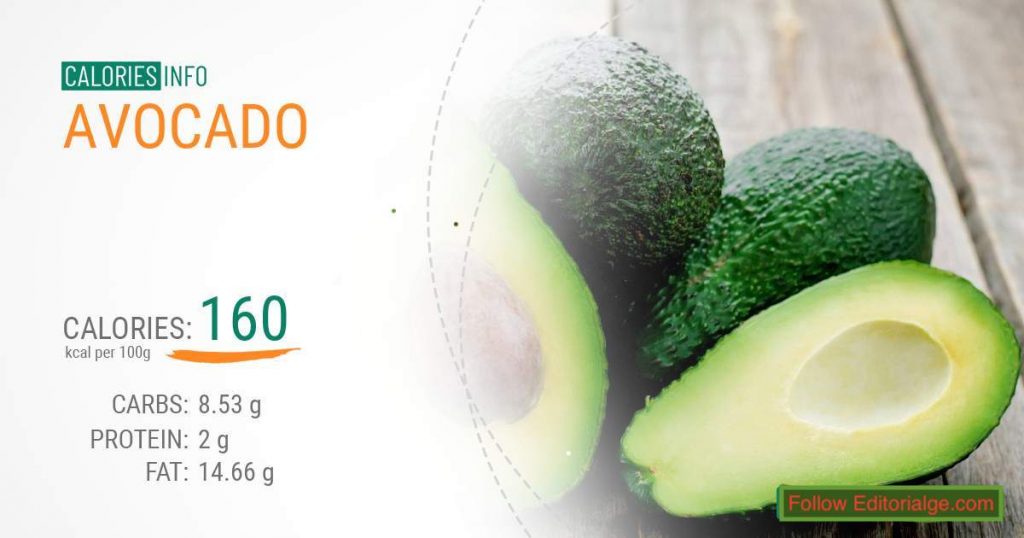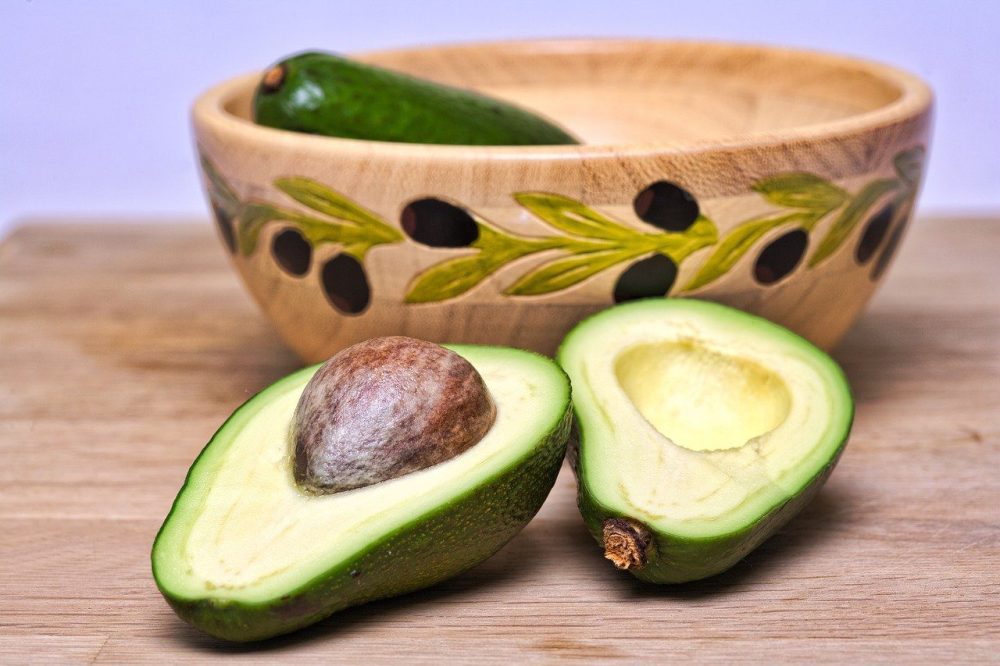Avocado calories: there are few fruits that cause as much obsession like this. The reason is avocado makes tostadas, tacos, and salads much tastier.
This green treat, native to Central and South America, became popular the moment people stopped worrying about fat a few years ago, says nutritionist Jessica Cording, RD, author of The Little Game Changer Book. “It became more socially acceptable to finally eat fat,” she says.
Despite the hype, there is some confusion about how this fruit contains so much fat or calories! “Rest assured, the fats (monounsaturated fats) in avocados are good for the heart and can help increase HDL ‘good’ cholesterol and lower LDL ‘bad cholesterol,” says Cording.
What’s not to like?
Avocados are also high in fiber, which is good for heart and gut health,” he adds. There are also many ways to put this fatty fruit on the plate. “Avocados can be eaten sweet-in a chocolate-crusted sugar-lime pie-or savory-in the form of guacamole and avocado toast,” says nutritionist Sonia Angelon, RD, of the Academy of Nutrition and Dietetics.
So avocados are not just another half avocado calories (Moussa, acai bowls). However, there are a few things you should know about them. Here’s what the experts say about Avocado Calories.
Nutritional information about avocado
Avocados are the pear-shaped fruits of the avocado tree. They have tough green skin. They contain a large seed called a stone. Hass avocados are the most widely grown avocado variety in the world. This variety is common in the U.S.
When ripe, avocados turn dark green or black. Avocados vary in size. Most avocados found in grocery stores are of medium size. The recommended serving size is approximately one-fifth of an average avocado. Here are the number of avocado calories half.
Are avocado calories useful?
Avocados are high in fat. But they are not the saturated fats found in some full-fat dairy products, red meat, and most junk food. The American Heart Association (AHA) recommends limiting the amount of saturated fat in the diet to reduce the risk of heart disease.
However, a 2011 meta-analysis found no link between saturated fats and heart disease and stroke. It is possible that trans-fats-fats found in partially hydrogenated oils, such as margarine play an important role. However, the AHA stands by its current recommendations.
Avocado Calories Half contain only small amounts of saturated fatty acids. Most of the fat in avocados consists of monounsaturated fatty acids (MUFAs). MUFAs are believed to reduce total and “bad” (LDL) cholesterol and increase “good” (HDL) cholesterol.
Vitamins and minerals in avocado calories
Red meat can contribute to inflammation in the body, among other things, because of its saturated fat content. Inflammation is one of the potential risk factors for heart diseases. Half Avocado Calories can help decrease inflammation in the body.
Eating half avocado calories with a hamburger instead of a hamburger alone lessens the production of substances that can help inflammation back in the body, according to a study in 2012.
Research suggests that avocados may help the body absorb certain nutrients from other foods. Avocados contain no cholesterol, sodium, or sugar. They are a rich source of many vitamins and minerals.
- Vitamin A
- Vitamin K
- Vitamin C
- Vitamin E
- Computer equipment
- Potassium
- Zinc
- Manganese
- B vitamins (except B-12)
- Hill
- Betaine
- Calcium
- Magnesium
- Phosphorus
- Copper
- Folate

Health benefits half avocado calories
Even if you eat more avocados than you should, you will still benefit your body. Avocados have been studied extensively, in part because the Hass Avocado Board funds much of the research. For this reason, it can be difficult to determine whether avocados are a specific food or another food containing healthy fat (such as nuts, seeds, or olive oil) that provides the benefits studied in a clinical trial or report.
Three areas of particular interest are the effects of avocado calories on diabetes, cholesterol levels, heart health, and weight control.
Avocado calories may improve diabetes control
Avocado calories can help people with diabetes. Although half avocado calories contain carbohydrates, they have virtually no effect on blood sugar levels because of their low glycemic index of less than 15. The glycemic index is a scale from 1 to 100, with higher numbers representing foods that raise blood sugar levels more quickly.
Half avocado calories are rich in monounsaturated fatty acids and are therefore a healthy choice for diabetics, especially when used in place of high glycemic index foods. Some studies have shown that avocado consumption improves blood sugar control in people with type 2 diabetes. In addition, there is considerable evidence that a diet rich in PUFAs can also improve metabolic health in people with type 2 diabetes.
The American Diabetes Association recommends substituting avocado for dairy products in morning smoothies, using it as a cholesterol-free spread on whole-grain toast, in salads, and in making dinner sauces. Avocado calories half can also be a quick snack like poppy seeds for celery, carrots, or other vegetables.
Avocado calories half may improve cholesterol levels
Several studies have shown that eating avocados can improve cholesterol levels in some people. In particular, studies have shown that people who eat half avocado calories have higher levels of HDL cholesterol.
Half avocado calories may contribute to weight loss
Although avocados are high in calories, they can be beneficial if you are trying to lose weight. The creamy texture and tangy taste of the (healthy) fats will make you feel full and satisfied when you eat them.
Half avocado calories also contain fiber. Eating foods that contain fiber can also help you feel full. Healthy eating and weight loss experts often recommend fiber-rich foods to people trying to reach and maintain a healthy weight, in order to eat less and achieve the caloric deficit needed to lose weight.
Studies have shown a relationship between avocado consumption and weight loss, body mass index (BMI), and waist circumference reduction. And some limited studies have shown that regular avocado consumption can reduce the risk of becoming overweight.
However, if you want to lose weight, you have to be careful how much you eat. Even healthy fats contain nine calories per gram, compared to carbohydrates and proteins, which contain four calories per gram.
You can use avocado calories half in place of other spreads or fillings that contain less healthy fats, such as butter or margarine, which may contain saturated or trans fats. If you control the caloric content of avocados and eat only a tablespoon (or even a little more) at a time, you’ll be doing your healthy eating plan a favor.
Other health benefits of avocado calories
Cancer: Folate in avocados may reduce the risk of certain types of cancer, such as prostate and colon cancer. The nutrients in half avocado calories may also treat cancer.
Arthritis and osteoporosis: Research on avocado calories half extracts has shown that they can alleviate the symptoms of osteoarthritis. Vitamin K in avocados supports bone health by slowing bone loss and preventing osteoporosis.
Depression: Research shows a link between depression and low folate levels. Folate helps prevent the buildup of a substance called homocysteine in the blood. Homocysteine slows the supply of nutrients to the brain and worsens depression. The high folic acid content of half avocado calories may help alleviate symptoms of depression.
Inflammation: Chronic inflammation can lead to many diseases, such as diabetes, Alzheimer’s disease, and arthritis. Vitamin E in half avocado calories lessens inflammation in the body.
Digestion: Half avocado calories are rich in dietary fiber. They are especially rich in insoluble fiber, which helps eliminate waste from the body. Fiber promotes regular eating habits and can prevent constipation.
Blood pressure: Avocados are rich in potassium. Potassium helps balance blood pressure by lowering the level of sodium in the blood and reducing tension in the blood vessel walls.
Heart: Most of the healthy fats in avocados are oleic acid, a monounsaturated fatty acid. This heart-healthy fat helps reduce inflammation in the cardiovascular system. Avocado calories half also contain the nutrient beta-sitosterol, the plant version of cholesterol. Beta-sitosterol helps lower cholesterol levels.
Vision: Lutein and zeaxanthin are two antioxidants that are present in avocado calories half good for the eyesight. They help protect eye tissue from UV damage and prevent cataracts and macular degeneration.
Pregnancy: During pregnancy, you need at least 400 micrograms of folate a day to prevent malformations in your baby’s brain and spine. An avocado provides approximately 41% of this amount.
Half Avocado calories
Half avocado calories are extremely tasty and nutritious. They also have a high caloric content. A 200 g avocado contains approximately:
- 322 kilocalories
- 29 grams of fat.
- 17 grams of carbohydrates.
- 4 grams of egg white.
Thus, for every 100 grams, that is, half avocado calories, about 160 kilocalories are consumed. In a nutshell:
Avocado Calories = 322 kilocalories ~ 320 kilocalories
Half Avocado calories (1/2) =161 kilocalories ~ 160 kilocalories
Therefore, the caloric content of a small avocado is also very high. People in the United States and the North American region are very fond of avocados because of their high caloric content.
For this reason, avocado nutrition is one of the most discussed topics in family medicine and dietetics.

Nutrition
Avocado is composed of approximately 73% water, 15% fat, 8.5% carbohydrates -mainly fiber- and 2% protein.
Half avocado calories are about 100 grams (g) of 160 calories.
Carbohydrates
Compared to other fruits, avocado calories half contain very little sugar.
Avocado calories half, or 100 g, contains only 0.66 g of sugar. This includes glucose, fructose, sucrose, and galactose.
Net digestible carbohydrates are only 1.8 g per 100 g of avocado.
Due to their low sugar content, they have a very low glycemic index, which means that they should not raise blood sugar levels too much.
Fiber
Most of the carbohydrates in avocados (79%) are dietary fiber.
A 100g serving of avocado contains 6.7g of dietary fiber, which is very high and covers 24% of the daily requirement.
Dietary fiber is an important dietary component with many health benefits.
It can regulate appetite, feed friendly bacteria in the gut and reduce the risk of many diseases, such as heart disease, stroke, obesity, type 2 diabetes, and depression.
Half avocado calories also contain FODMAPs (fermentable oligo-, di-, monosaccharides, and polyols), short-chain carbohydrates that some people cannot digest. Not everyone is sensitive to FODMAPs but people suffering from irritable bowel syndrome (IBS) can cause uncomfortable digestive symptoms.
Bottom line: Avocado calories half are high in fiber and low in sugar. They also contain FODMAPs, short-chain carbohydrates that can cause unpleasant digestive symptoms in some people.
You can find here more information on the health benefits of fiber and a list of 38 fiber-rich foods.
Grease
As a rich source of monounsaturated fatty acids, avocado is a very special fruit. There are different types of dietary fats. This type is good for your health.
The most common fatty acid is oleic acid, which is also the main component of olive oil.
Studies have linked oleic acid to the reduction of inflammation, and it may have a positive effect on cancer.
Half avocado calories are rich in monounsaturated fatty acids, mainly oleic acid. They can help keep the body fit against heart disease, diabetes, and cancer.
Vitamins and minerals
Avocado calories half are rich in important vitamins and minerals. Among the richest are:
Folic acid (B-9): Avocados contain large amounts of folic acid, which is important for normal cell function and tissue growth and is essential for pregnant women.
Vitamin K-1: Vitamin K-1 is important for blood clotting and may have a positive effect on bone health.
Potassium: This is an important mineral that is good for blood pressure control and heart health.
Half avocado calories contain more potassium than bananas
Copper: Avocados are a rich source of copper. This micronutrient is relatively low in the Western diet. A low copper intake can have a negative impact on heart health.
Vitamin E: This vitamin is a powerful antioxidant that is usually found in large quantities in fatty plant foods.
Vitamin B-6: These vitamins help transform food into energy.
Vitamin C: Vitamin C is an important antioxidant for immune function and skin health.
The following table lists the vitamins and minerals contained in avocados per 100 g in milligrams (mg) or micrograms (µg)
Avocado calories half allergy
If you are allergic to latex, you should consult your doctor before adding avocados to your diet. People with a severe latex allergy may also experience symptoms after eating avocados. This is also known as latex food syndrome or latex fruit allergy.
Latex products are made from a protein found in the sap of the Brazilian rubber tree (Hevea brasiliensis). Avocado calories half contain a very similar protein that triggers an allergic reaction. Symptoms may be mild or severe. They can also get worse each time avocado calories half are eaten.
Important recommendations on Avocado calories
Want to know how many avocados to add to your basket? First, you need to consider your weight goals, gut health, and overall healthy eating, as well as your body type, activity level, and genes, says Cucuzza.
“I generally recommend eating ½ to 1 avocado a day,” he says.
He points out that avocados are a fairly high source of healthy monounsaturated fats, induce a feeling of fullness, and are harder to digest because they are filling (Of the 20-25 grams of fat in avocado calories half, 15 grams is monounsaturated fat).
Keep in mind that avocado calories half cannot be said to be low in calories: an avocado typically contains between 200 and 300 calories, depending on its size. But functional medicine specialists don’t usually focus only on calories, says Cucuzza: “We have found that when patients eat more real food and less processed food, everything improves.
Frequently asked questions
Can avocado calories half reduce cholesterol levels?
Two-thirds of UK adults are thought to have high cholesterol. Cholesterol is one of the major risk factors for heart disease.
In a recent study of people with moderately high cholesterol, those who ate half avocado calories significantly reduced their cholesterol levels after only one week.
The monounsaturated fatty acids in avocados not only help reduce cholesterol levels, but also the risk of heart attack and heart disease.
Can people help with anxiety?
Of course, no food can substitute for proper support and treatment, but people with anxiety are likely to be better off if they consume more foods containing B vitamins.
Avocado calories half are rich in B vitamins. Foods like avocados that contain these vitamins release neurotransmitters such as serotonin and dopamine, which help improve mood.
How do half avocado calories act on the skin and is it suitable for a face mask?
Celebrities like Victoria Beckham have applied them to their skin and avocados are rich in monounsaturated fatty acids. So you can say that this fruit is ideal for a homemade face mask.
Avocados are rich in omega-3 fatty acids, moisturize the skin without clogging pores and also contain vitamin C, a natural skin lightener!
Apart from this, you can also read Entertainment, Tech, and Health-related articles here: How to delete Reddit Account, Sweet Home Season 2, How much are perals worth, Rainbow Kiss, MovieRulz, Sex Education season 3, NFL Live Stream, Youtbe, Bailey Sarian Net Worth, Bollyshare, Afdah, 1616 Angel Number, 444 Angel Number, Moviezwap, Y8, Jalshamoviez, Project Free TV, Kickassanime, 777 Angel Number, Kissasian, 666 Angel Number, 333 Angel Number, Holiday Season, Samsung Galaxy Z Flip 3 review, PUBG Launch Date in India, Sears Credit Card, GoDaddy Email, Free Fire Redeem Code, Mangago, Jio Rockers, Eye Shapes, M4uHD, Fever Dream, Moon water, iPhone Headphones, Spanish Movies, Hip dips, M4ufree, NBAstreams XYZ, CCleaner Browser review, Bear Grylls net worth, Rihanna net worth 2021, Highest Paid CEO, The 100 season 8, Sundar Pichai net worth, Grimes net worth, F95Zone, how to change Twitch name, Sherlock Season 5, Homeland Season 9.








































